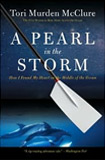Summary | Excerpt | Reading Guide | Reviews | Beyond the Book | Readalikes | Genres & Themes | Author Bio

How I Found My Heart in the Middle of the Ocean
by Tori Murden McClure
Luckett Davidson had helped me with my nutritional plan. She
was worried that, as a vegetarian, I’d have trouble getting enough
protein. She added protein supplements to the vitamins she packed
for each day. We consulted experts in sports nutrition, but the most
helpful expertise came from Gérard d’Aboville. He told Luckett,
"Just fill the boat with things she likes to eat. The trip will be three
months. She can eat like a teenager, it will do no harm." With this, I
took out the food list, crossed off the oatmeal PowerBars, and wrote
in chocolate PowerBars.
For breakfast each day, I would eat some variety of granola. I
didn’t plan to stop for lunch. Instead, I would graze on a variety
of food bars throughout the day. In the middle of the afternoon, I
would have some special snack. Crackers, nuts, candy—these snacks
were not so much about nutrition as they were about breaking up
the monotony of food bars. For liquid calories we packed powdered
Gatorade, hot chocolate, and a variety of dried soups.
After dinner, I lashed down my oars and secured everything on
deck. The wind blew from shore at about eighteen miles per hour,
and the night sky looked as dark as a cavern. Soon a noisy thunderstorm
overtook me. Rain beat down, and lightning darted from
cloud to ocean. I climbed into my cabin, stretched out on the mat,
and turned off the flashlight. As I lifted a knee it bumped against the
ceiling, and a drop of cold water fell into my eye.
I lunged for the light. We’d constructed the roof from a 3/8-
inch-thick sheet of mahogany plywood, reinforced with a layer of
six-ounce fiberglass. Twelve brass bolts secured two solar panels to
the roof. Rainwater dripped in through one of the bolt holes. That’s
just great. My first day at sea and I have a leak already. Gérard had
warned me about such things. "At sea in a boat, there is always something
that needs repair. If you stop rowing every time you hear a
squeak or some imperfection draws your attention, you will never
reach France." Gérard had recommended I set aside Sunday mornings
for such tasks. I’ll plug the leaky bolt on Sunday. With this issue
settled in my mind, I rolled away from the annoying drip.
I was twenty miles from shore. Once I entered the Gulf Stream,
the current would be so powerful that it would be easier to row
to France than it would be to row back to North Carolina. When
Gérard rowed from the United States to France, he left from Cape
Cod, Massachusetts, which is nine hundred miles closer to France. I
picked North Carolina because it is closer to the Gulf Stream.
In the 1760s, while he was the postmaster general of North America,
Benjamin Franklin noticed that American ships could make the
journey from the colonies to England in an average of four weeks.
The average for English ships was six weeks. When Franklin investigated,
he learned that Nantucket whaling captains had mapped
a current of warm water that traveled north from Florida and the
Carolinas before it turned northeast toward Europe. American sea
captains knew enough to take advantage of this warm-water current
going toward Europe and avoid it as they came home.
I was counting on the Gulf Stream to push me two-thirds of the
way across the Atlantic. Two British rowers, David Johnstone and
John Hoare, had tried a similar route in 1966. Their boat reached
Europe; the men did not. I had studied their scientific reasoning, and
I believed it to be sound. Just because Johnstone and Hoare died doesn’t
mean they were wrong. Right? To refine my research on the matter, I
had taken a seminar on the Gulf Stream from Jenifer Clark, a distinguished
scholar who maps ocean currents. Jenifer had convinced me
that the benefits of rowing with the Gulf Stream would more than
make up for the added distance. Gérard seemed less certain, but he
didn’t debate the issue.
Excerpted from A Pearl in the Storm by Tori Murden McClure. Copyright © 2009 by Tori Murden McClure. Excerpted by permission of Collins, a division of HarperCollins, Inc. All rights reserved. No part of this excerpt may be reproduced or reprinted without permission in writing from the publisher.
Your guide toexceptional books
BookBrowse seeks out and recommends the best in contemporary fiction and nonfiction—books that not only engage and entertain but also deepen our understanding of ourselves and the world around us.